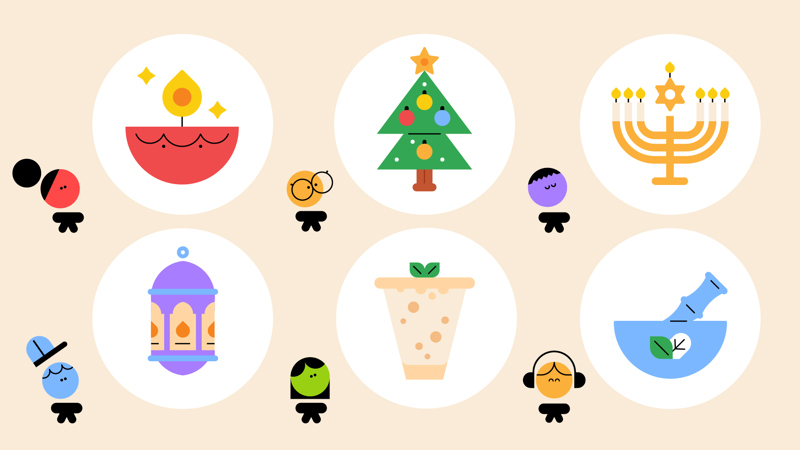
Interacting with different communities
Scouts is open to everyone. We don’t identify exclusively with one faith, and we welcome people of all faiths and of none.
We know it’s important for people to learn about each other, including understanding different faiths and beliefs. Scouts always respects people’s beliefs, faiths and cultures, and everyone should be open to learn.
As an inclusive and values based movement, we support our members to engage and learn about different faiths and beliefs in an exciting and meaningful way, even if they don’t have a faith themselves.
Celebrating and understanding differences, including differences in faiths and beliefs, is an important part of our Scout values, which are:
- Integrity: We act with integrity; we are honest, trustworthy and loyal.
- Respect: We have self-respect and respect for others.
- Care: We support others and take care of the world in which we live.
- Belief: We explore our faiths, beliefs and attitudes.
- Co-operation: We make a positive difference; we co-operate with others and make friends.
Our value of Belief and its exploration helps Scouts to learn from other faiths and beliefs. This encourages them to develop or build their personal beliefs and understand their shared values, whether faith-based on not.
We know that learning about faiths, beliefs and different attitudes can help to break down barriers, helps us all to recognise what we have in common, and teaches us to value and respect other people. It also helps us to build up respect, acceptance and knowledge for each other, leading to a more co-operative and inclusive society.
In our diverse society, people can sometimes feel cautious talking about this sensitive subject. However, it's important that Scouts offers young people safe, exciting and open spaces to explore faiths and beliefs. They should be able to engage in personal reflection, as they question and develop their opinions and understanding of the world around them.
Making time for personal reflection and developing our beliefs means exploring the places, people, communities, celebrations or stories which hold meaning for us, and it may not necessarily mean exploring a faith.
For example, someone’s shared values may be their Scout Values and that person may choose to reflect on them at important times, such as when they make their Promise. Others may choose to reflect at certain times of the year, such as a faith-based festival, birthdays, meaningful events or at New Year. Some people may still celebrate events, such as Christmas, but use it as a time to celebrate family, friends and loved ones, as well as for charity and giving.
Discover more about Faiths and Beliefs in Scouts.
Before you begin
- Use the safety checklist to help you plan and risk assess your activity. Take a look at our guidance to help you carry out your risk assessment, including examples.
- Make sure all young people and adults involved in the activity know how to take part safely.
- Make sure you’ll have enough adult helpers. You may need some parents and carers to help if you’re short on helpers.
Learning about different communities
The best place to start is where you’re at – wherever you usually meet. The best visits are the ones where everyone plans together, helping to decide which faiths, cultures or occasions they’d like to learn more about.
To learn about the things which are important in different communities, you have to ask why, so you can start to see the world through someone else’s eyes. Learning isn’t just about words, it’s about getting stuck in – see what the clothes feel like, hear the beat of the music, and taste the flavours of the food.
To begin exploring a faith, think about its key beliefs, important practices such as fasting or wearing special clothes, and important dates. If you choose a culture, explore traditional arts and crafts, dancing, clothes and music.
For occasions, discover which dates are significant to different people and how they mark them.
When it comes to planning the trip, it’s all up to you. Let everyone have their say through a Forum, or go online to find out where people gather in your local area.
You could also email parents and carers for their recommendations – you never know who’ll have the perfect piece of advice.
The National Scout Active Support Faith Units are the best people to chat to if you want to know more about a particular faith.
Planning the trip
To get the most out of your trip, do some preparation before you go.
- Use the safety checklist to help you plan and risk assess your activity. Additional help to carry out your risk assessment, including examples can be found here. Don’t forget to make sure all young people and adults involved in the activity know how to take part safely.
- Make sure you’ll have enough adult helpers. You may need some parents and carers to help if you’re short on helpers
- Make sure everyone knows about the dress code – do you need to make sure your clothing is appropriate and respectful?
- Think about any questions you have – it’s great to think on your feet, but it’s also good to be prepared. What do you want to find out?
- Look at other buildings used by the religion or culture around the world. Do they have any features in common (for example, stained glass windows or domed roofs)? Note them down (drawing is fine) to take with you on your visit. Do you think the place your visiting will have any of the things on your list?
While you’re there
It’s up to you to make the most of your visit by opening your eyes, ears, and mind. This is a great time to ask questions – just make sure you listen to the answers, and try to see things from their point of view.
Remember that faiths, beliefs, cultures and communities are very important to a lot of people, so it’s important to be respectful, especially if we don’t understand something.
Visits to new places are also a great time to use all your senses to notice what’s around you – what about colours, smells, textures, and sounds? Does anything stand out to you? Is anything familiar? How do you feel?
Reflection
This visit helped you to value and trust others for who they are. Did you meet anyone while visiting? What were they like? What did you learn about the faith or culture? Do people who go to the place you visited have any things in common with you? Did you do anything to show that you respected and valued people and their place of worship (or cultural centre)?
This visit also reminded you that you’re a local, national, and international citizen. What did you expect the place to look like, and what did you think would happen there? What was it like – was it a big colourful hall with a lot of art, or a small quiet room? What were people down – were they praying, dancing, or eating? Was it like you expected? Is it a good thing that citizens are diverse and different? What do local, national, and global citizens share? What responsibilities do we have to other citizens (whether they’re the same or different to us)?
Safety
All activities must be safely managed. You must complete a thorough risk assessment and take appropriate steps to reduce risk. Use the safety checklist to help you plan and risk assess your activity. Always get approval for the activity, and have suitable supervision and an InTouch process.
- Visits away from your meeting place
Complete a thorough risk assessment and include hazards, such as roads, woodland, plants, animals, and bodies of water (for example, rivers, ponds, lakes, and seas). You’ll probably need more adult helpers than usual. Your risk assessment should include how many adults you need. The young people to adult ratios are a minimum requirement. When you do your risk assessment, you might decide that you need more adults than the ratio specifies. Think about extra equipment that you may need to take with you, such as high visibility clothing, a first aid kit, water, and waterproofs. Throughout the activity, watch out for changes in the weather and do regular headcounts.
When visiting a place of worship or cultural centre, make sure it meets everyone’s needs (for example, wheelchair accessibility if anyone’s a wheelchair user). Work with anyone with additional needs to plan ahead and check before you go.
All Scout activities should be inclusive and accessible.
Everyone should be able to take an active role in choosing the faith and culture to explore, and helping plan the visit.



